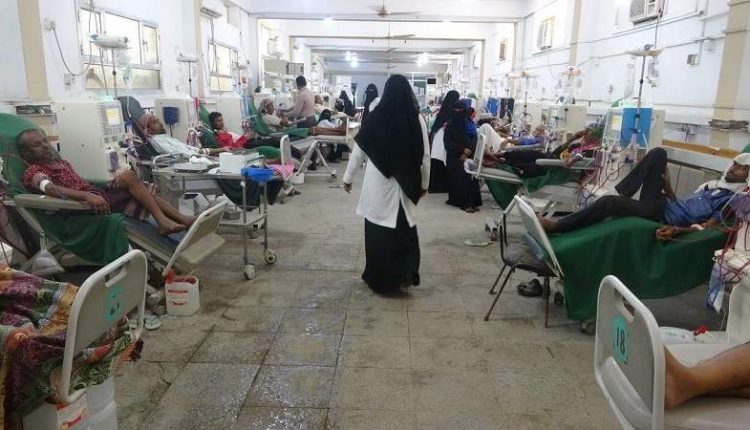Thousands of Renal Failure Patients Threatened with Death, Medicines Running Out, US-Saudi Blockade Continues
The official for international cooperation at the Ministry of Health, Murtadha Al-Murtadha, confirmed that the medicines for renal failure’s patients in the Ministry of Health’s storage are about to run out by the end of this year.
Al-Murtadha stated to Almasirah, Tuesday, that 4,150 patients with renal failure are threatened with inevitable death if the dialysis sessions stop, as medicines run out. He said, “We addressed the United Nations organizations months ago regarding the provision of drugs for kidney failure for the year 2023, and delay is the master of the situation.” He indicated that due to the blockade on Sana’a Airport and the port of Hodeidah, the state is unable to import medicines, and therefore we resort to United Nations organizations.
The official for international cooperation at the Ministry of Health pointed out that the documents of the Ministry of Public Health presented by Almasirah show calls for the World Health Organization since January 2022 to provide medicines for renal failure and warn of depletion of stock.
Earlier on December, the Minister of Health, Dr. Taha Al-Mutawakel, reviewed with the Executive Director of the United Nations Children’s Fund (UNICEF), Catherine Russell, the needs of the health sector with regard to childhood care.
During the meeting, Al-Mutawakel pointed out the importance of the visit to see closely the scale of the humanitarian disaster in Yemen, especially what children and women are exposed to as a result of the continued aggression and siege. He emphasized that women and children were directly targeted by the US-Saudi aggression, which caused long-term psychological and physical suffering, indicating that the aggression killed more than eight thousand children and women over eight years.
He pointed out that the US-Saudi crimes continue through the increase in cases of fetal deformities resulting from raids and cluster bombs, explaining that Al-Sabeen Hospital witnesses many of these cases.
The Minister of Health reviewed the needs of the health sector with regard to childhood, which UNICEF relies on to provide to ensure the protection of newborns and children from deadly and life-threatening diseases through the provision of incubators and medicines, stressing the need for continued support for urgent needs and the expansion and operation of health centers and units.
He urged the evaluation of the work of UNICEF during the past period, and the promotion of joint work between the ministry and the organization.
The Minister of Health handed the UN official a number of files on the crimes of the US-Saudi aggression against children and women, calling on the organization to raise the voice loudly in international forums about the disaster lived by the Yemeni children.
For her part, the UNICEF Executive Director indicated that there is a great need in the health sector and that she will work to mobilize support from donors.
She emphasized the keenness to enhance cooperation between the organization and the ministry and work according to a joint plan to alleviate the suffering of children in Yemen.
On November, Eye of Humanity Center (Ain al-Insiyah Center) for Human Rights and Development issued a report documenting the crimes of the US-Saudi-Emirati aggression against the Yemeni people during 2,800 days of aggression.
The Center stated that the total number of victims of aggression reached 47,673 were killed and wounded, including 18,013 were killed and 29,660 were wounded. It also confirmed 4,061 children were wounded, 4,739 others were killed. 2,454 women were kiiled and 2,966 other women were wounded, in addition 11,498 citizens were killed and 21955 citizens were wounded.

